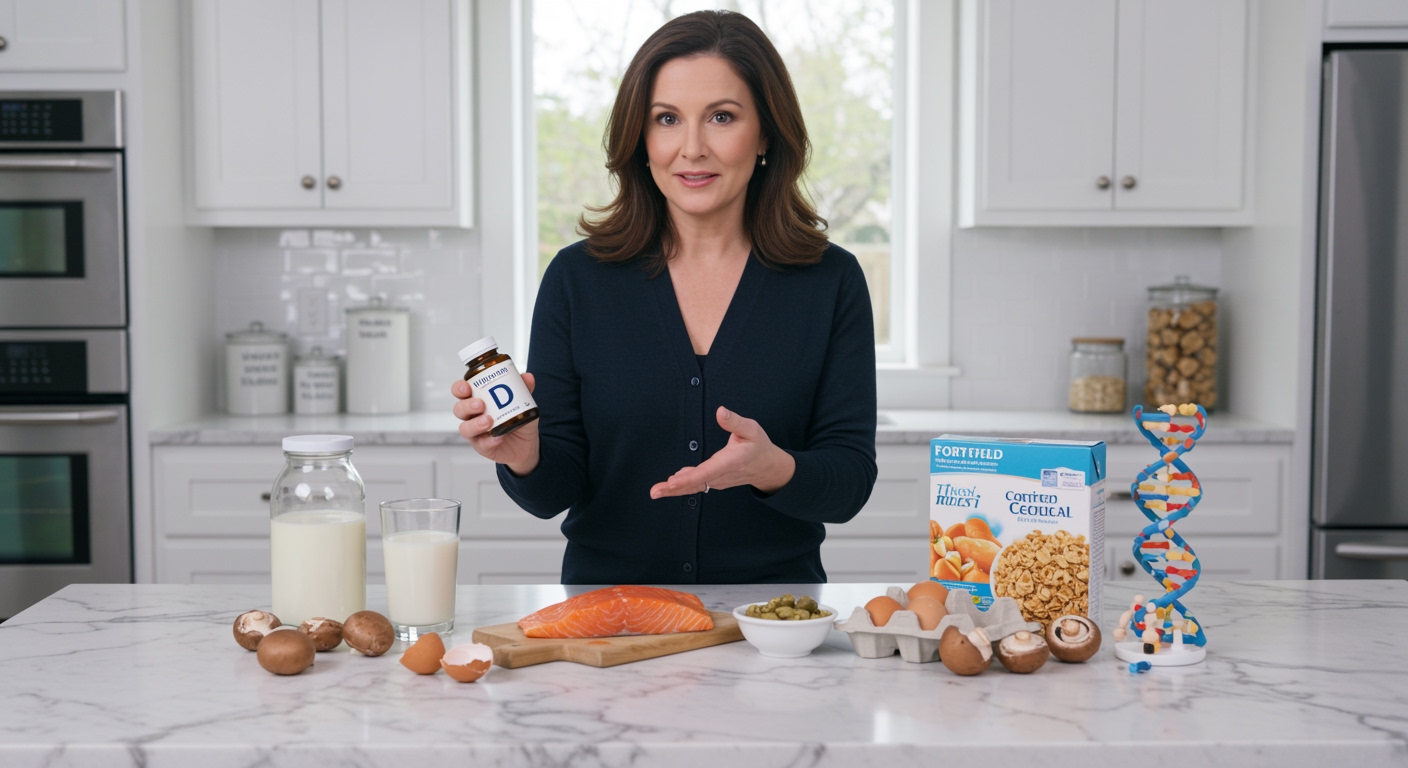✪ Key Highlight: Daily vitamin D supplements support cellular structures that control aging, potentially adding years to healthy lifespan.
Introduction
Scientists just discovered something remarkable about the sunshine vitamin that could change how we think about aging.
A groundbreaking study published in The American Journal of Clinical Nutrition shows that taking 2,000 IU of vitamin D daily helps preserve telomeres, the protective caps on our chromosomes that determine how fast we age.
Hi, I’m Abdur, your nutrition coach and today I’m going to analyze this exciting research about vitamin D supplements and their potential to slow down the cellular aging process.
What Are Telomeres And Why Do They Matter?
Think of telomeres as the plastic tips on shoelaces that prevent them from fraying.
These tiny structures sit at the end of each of our 46 chromosomes and prectect our DNA from damage every time cells divide.
Every time a cell copies itself, telomeres get a little shorter.
When telomeres become too short, cells can no longer divide and eventually die.
Scientists have linked shorter telomeres to our most feared diseases of aging, including cancer, heart disease, and osteoarthritis.
Smoking, chronic stress, and depression all speed up telomere shortening, while inflammatory processes in the body also take their toll.
Professor Morten Schiebye-Knudsen from the University of Copenhagen explains that cells with shortened telomeres become like “angry old men” – they lose their function and make the environment around them bad.
✪ Fact: You start life with about 8,700 base pairs in your telomeres, and they shorten with each cell division.
How Did Scientists Test Vitamin D Against Aging?
The research comes from a large clinical trial called VITAL, led by researchers at Mass General Brigham and the Medical College of Georgia.
This is the first long-term test to show that vitamin D supplements preserve telomeres and preserve their length.
Scientists examined the white blood cells of more than 900 people enrolled in the VITAL trial.
Roughly half the participants took 2,000 IUs of vitamin D3 per day while the other half took a placebo.
When researchers compared telomere length in white blood cells between the two groups, they found a significant difference.
Telomeres in the vitamin D group were longer over time, losing 140 fewer base pairs of DNA on average over four years.
Based on previous studies, this difference could equal up to three years of aging protection.
✪ Pro Tip: The study used vitamin D3, which is more effective than vitamin D2 at raising blood levels.
What Dose Of Vitamin D Shows Anti-Aging Benefits?
The researchers used 2,000 IU daily, which is much higher than current recommended intakes.
Current guidelines suggest 600 IU for people under 70 and 800 IU for older adults.
However, there is no agreement on the right dose for anti-aging benefits.
Other research suggests just 400 IU might help prevent colds, showing that optimal doses vary by health goal.
Experts say the optimal dose probably depends on individual factors, including existing vitamin D levels, overall nutrition, and how the vitamin interacts with other nutrients.
Beyond its role in bone health, vitamin D also powers our immune system and helps reduce inflammation.
A review of evidence found that vitamin D supplements can cut respiratory infections, especially in people who are deficient.
✪ Note: Always check your vitamin D blood levels before starting high-dose supplementation.
Are There Any Risks With Longer Telomeres?
While longer telomeres are generally seen as protective, some researchers warn about potential risks.
Longer telomeres may increase the risk of certain diseases, showing that the relationship between telomere length and health is complex.
This means more research is needed to understand the full picture of telomere manipulation.
The study findings do not mean everyone should start taking large doses of vitamin D without medical guidance.
For those who are deficient in vitamin D or at risk of poor bone health, supplements remain a sensible choice backed by decades of research.
The strongest evidence for healthy aging still points to the basics: a balanced diet, regular exercise, quality sleep, not smoking, and managing stress.
✪ Pro Tip: Focus on lifestyle fundamentals first, then consider supplementation as additional support.
The Bottom Line
This groundbreaking research shows that vitamin D supplements may help slow one of the key biological processes of aging by preserving telomere length.
Supplements are tools, not magic bullets – your lifestyle choices remain the foundation of healthy aging.
What are your thoughts on vitamin D supplementation for anti-aging benefits, and do you have any questions about optimal dosing or safety considerations that I can help clarify in the comments below?
References
At NutritionCrown, we use quality and credible sources to ensure our content is accurate and trustworthy. Below are the sources referenced in creating this article:
- Science Focus: Vitamin D Ageing Telomeres
- SciTech Daily: Groundbreaking Study Reveals Vitamin D May Slow Biological Aging
- EurekAlert: Vitamin D Supplements May Slow Cellular Aging
- NHLBI: Vitamin D Supplements May Slow Cellular Aging
- Science Alert: Can Vitamin D Slow Aging Study Says Yes But Theres A Catch





